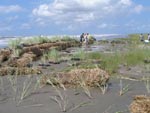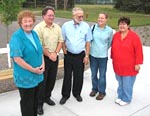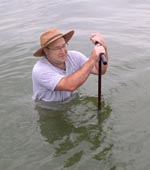|
| |
 
The Natural Resources Conservation Service —
Helping People Help the Land.
Subscribe to NRCS This Week
| NRCS This Week Articles Index | NRCS
This Week Archives |
Contact Us |
Where to Get Information
|
eNotes from
NACD |
 TSP Express
(Requires Adobe Acrobat.) TSP Express
(Requires Adobe Acrobat.)

Louisiana
 Innovative
Dune and Beach Restoration Innovative
Dune and Beach Restoration
Louisiana’s Lafourche-Terrebonne Soil and Water Conservation District and NRCS
Earth Team volunteers are working together to restore beaches, dunes, and
wetlands on Fourchon Beach. Recently, local estuary program volunteers gathered
to plant native wetland grasses and try some new techniques to protect the beach
and build dunes.
Minnesota
 Prairie
Landscape Project Completed Prairie
Landscape Project Completed
NRCS RC&D and local officials gathered to observe the completion of a native
prairie landscaping project at the Sherburne County, Minnesota, History Center.
The project, which involved a number of State and federal agencies working in
partnership, reintroduced native plants, prairie grasses and trees.
Virginia
 Virginia Completes Its First Subaqueous Soil Survey Virginia Completes Its First Subaqueous Soil Survey
As part of an effort to restore declining oyster habitat, Chesapeake Bay
enthusiast Christine Smith is working with NRCS to construct and seed an oyster
reef. To locate the best site for construction of the new reef in the
shallow waters along Christine’s property in Gloucester, Virginia, NRCS — with
Technical and financial assistance provided through the Wildlife Habitat
Incentives Program — undertook its first subaqueous soil survey in the State.
Connect to
NRCS' State
News,
Newsroom, and
News Releases!

 Hispanic Heritage Month
Is
September 15-October 15, 2006! Hispanic Heritage Month
Is
September 15-October 15, 2006!
The
theme for this year's Hispanic Heritage Month is "Hispanic Americans: Our Rich
Culture Contributing to America's Future."
Learn
more about the National
Association of Professional Hispanic Natural Resources Conservation Service
Employees.
Links…
See
the President's 2006 National Hispanic Heritage Month Proclamation.

Animal Waste Management
(AWM) Software
AWM is a planning/design tool for animal feeding operations that can be used to
estimate the production of manure, bedding, process water, and determine the
size of storage/treatment facilities. The procedures and calculations used in
AWM are based on the NRCS
Agricultural Waste
Management Field Handbook.
Follow this link to learn
more about NRCS AWM software, State Databases, and the AWM User Guide.

Click here for
NRCS Directives for the week of September 17, 2006
The U.S. Department of Agriculture (USDA) prohibits discrimination in all its
programs and activities on the basis of race, color, national origin, age,
disability, and where applicable, sex, marital status, familial status, parental
status, religion, sexual orientation, genetic information, political beliefs,
reprisal, or because all or a part of an individual's income is derived from any
public assistance program. (Not all prohibited bases apply to all programs.)
Persons with disabilities who require alternative means for communication of
program information (Braille, large print, audiotape, etc.) should contact
USDA's TARGET Center at (202) 720-2600 (voice and TDD). To file a complaint of
discrimination write to USDA, Director, Office of Civil Rights, 1400
Independence Avenue, S.W., Washington, D.C. 20250-9410 or call (800) 795-3272
(voice) or (202) 720-6382 (TDD). USDA is an equal opportunity provider and
employer.
| | |


